The Virtues of Vinegar.
Vinegar is a natural product and has myriads of uses in the kitchen, but it can also work miracles in the garden! Here are a dozen ways you can use vinegar to benefit your garden and reduce the amount of chemicals you use.
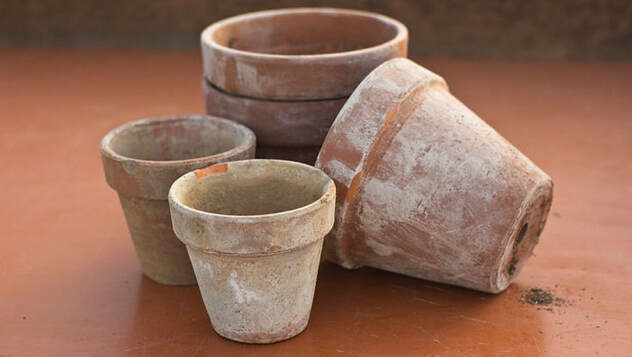
1. Clean Clay Pots
Clay pots help keep the soil cool inside the pot in the summer, prevents water from being trapped and their warm reddish colour provide attractive look too. However, as they age, they absorb calcium, minerals, and salts from water and fertilizers all making them look ugly. If you want to bring them to their original glory– Use vinegar. Fill a sink or large container with warm water and dishwashing liquid and add one cup of vinegar. Wash the pots as you would wash your dishes with a scrubbing brush to thoroughly remove all the debris and staining. After your pots are clean, rinse them well and leave them in the sun to dry completely.
Clay pots help keep the soil cool inside the pot in the summer, prevents water from being trapped and their warm reddish colour provide attractive look too. However, as they age, they absorb calcium, minerals, and salts from water and fertilizers all making them look ugly. If you want to bring them to their original glory– Use vinegar. Fill a sink or large container with warm water and dishwashing liquid and add one cup of vinegar. Wash the pots as you would wash your dishes with a scrubbing brush to thoroughly remove all the debris and staining. After your pots are clean, rinse them well and leave them in the sun to dry completely.
2. Remove weeds on walls and walkway
Using vinegar is a great way to eliminate weeds that pop up on the walls of your garden or from the crevices of the walkway. To kill them, simply spray the place with pure white vinegar.
Using vinegar is a great way to eliminate weeds that pop up on the walls of your garden or from the crevices of the walkway. To kill them, simply spray the place with pure white vinegar.
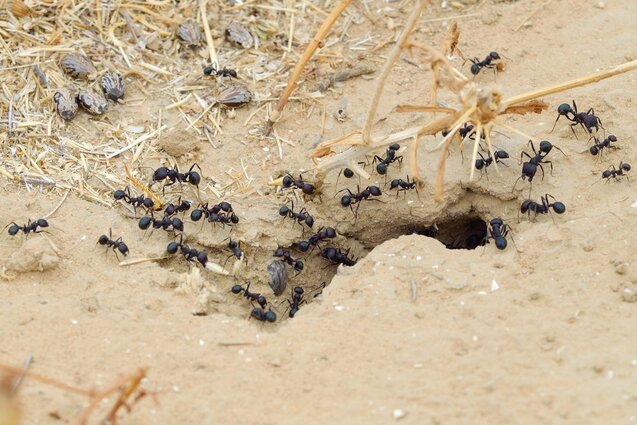
3. Get rid of ants
Vinegar is very effective in getting rid of ants. To repel ants, mix equal amounts of water and vinegar (either white or apple cider) and spray the solution on the ant hills in your garden. In the home, look out for ant’s entry paths, counter tops, sink, and windows. The strong scent of vinegar will make the ants avoid the places sprayed with vinegar.
Vinegar is very effective in getting rid of ants. To repel ants, mix equal amounts of water and vinegar (either white or apple cider) and spray the solution on the ant hills in your garden. In the home, look out for ant’s entry paths, counter tops, sink, and windows. The strong scent of vinegar will make the ants avoid the places sprayed with vinegar.
4. Keep away animals from garden
Many animals including common garden destroyers like rodents, moles, cats, dogs, rabbits, and deer loathe the strong scent of vinegar. You can keep out these unwanted visitors from the garden by soaking several old clothes in white vinegar and placing them on stakes around your garden where they usually come most.
Resoak the clothes about every 6-7 days regularly for better results.
Many animals including common garden destroyers like rodents, moles, cats, dogs, rabbits, and deer loathe the strong scent of vinegar. You can keep out these unwanted visitors from the garden by soaking several old clothes in white vinegar and placing them on stakes around your garden where they usually come most.
Resoak the clothes about every 6-7 days regularly for better results.
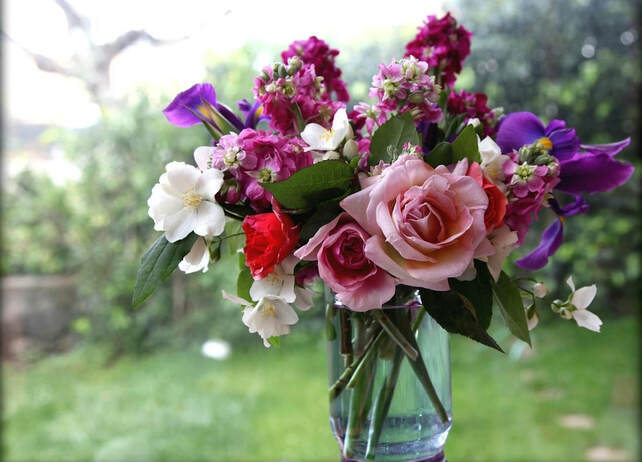
5. Extend the life of cut flowers
You can use vinegar to extend the life of cut flowers. Just add 2 tablespoons of vinegar and a teaspoon of sugar per litre of water.
You can use vinegar to extend the life of cut flowers. Just add 2 tablespoons of vinegar and a teaspoon of sugar per litre of water.
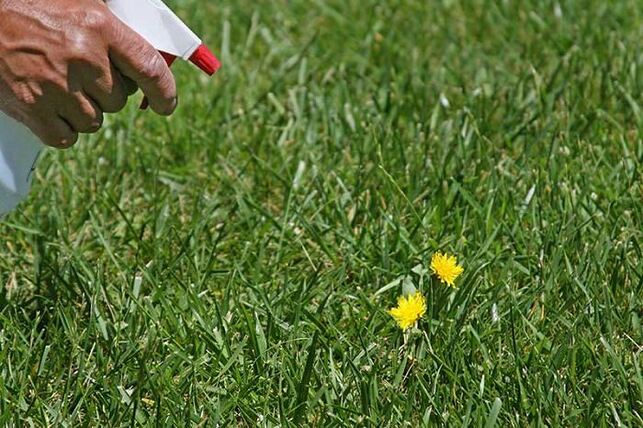
6. Kill Weeds
Vinegar is a weed killer and can be used for effective weed control. Spraying it kill weeds within 2-3 days after application. Mix a 50-50 vinegar-to-water solution in a spray bottle and spray directly on weeds growing nearby.
Vinegar is the most potent when used on weeds and grass, but it’s acidic enough to harm some of the other plants in your garden as well. Avoid spraying vinegar directly on your vegetables or flowers. As long as you are using the more diluted solution, the mist from the vinegar shouldn’t harm your garden's plants, but, if the solution isn’t working to get rid of insects, don’t increase the amount of vinegar you use.
Vinegar is so effective at eliminating garden pests that vinegar-based sprays are now being manufactured exclusively for use in yards and gardens. These sprays are very strong, up to 1,000 times the strength of household vinegar, and kill everything, both insects and plants. They should be used only on extremely infested gardens that are already a lost cause.
Vinegar is a weed killer and can be used for effective weed control. Spraying it kill weeds within 2-3 days after application. Mix a 50-50 vinegar-to-water solution in a spray bottle and spray directly on weeds growing nearby.
Vinegar is the most potent when used on weeds and grass, but it’s acidic enough to harm some of the other plants in your garden as well. Avoid spraying vinegar directly on your vegetables or flowers. As long as you are using the more diluted solution, the mist from the vinegar shouldn’t harm your garden's plants, but, if the solution isn’t working to get rid of insects, don’t increase the amount of vinegar you use.
Vinegar is so effective at eliminating garden pests that vinegar-based sprays are now being manufactured exclusively for use in yards and gardens. These sprays are very strong, up to 1,000 times the strength of household vinegar, and kill everything, both insects and plants. They should be used only on extremely infested gardens that are already a lost cause.
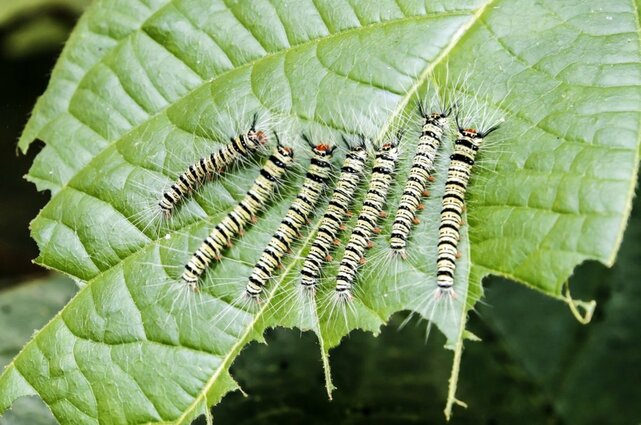
7. Vinegar garden insect spray
Organic gardening has many benefits. At the top of that list is avoiding the chemicals present in pesticides, which are regularly used in non-organic gardening. Not being able to use pesticides on a garden, however, can present a challenge to organic gardeners when trying to keep away garden-loving insects. A few common household substances can be used for organic pest control, including vinegar.
While both white and apple cider vinegars are effective at eliminating garden pests, white vinegar is generally cheaper than apple cider vinegar, so it’s your best option if you want to save some money. To create a vinegar spray that works on garden insects, combine three parts water with one part vinegar in a spray bottle and add a teaspoon of dishwashing detergent. Swirl in the spray bottle to mix the contents thoroughly before use on the garden.
A vinegar spray can ward off several different species of insect. Slugs, moths and ants are just a few of the vinegar-phobic pests in your garden. Once your vinegar solution is mixed up, spray only the leaves of your garden plants about once each week. You can also create an invisible wall for those insects that crawl into the garden by spraying around the garden’s perimeter.
Organic gardening has many benefits. At the top of that list is avoiding the chemicals present in pesticides, which are regularly used in non-organic gardening. Not being able to use pesticides on a garden, however, can present a challenge to organic gardeners when trying to keep away garden-loving insects. A few common household substances can be used for organic pest control, including vinegar.
While both white and apple cider vinegars are effective at eliminating garden pests, white vinegar is generally cheaper than apple cider vinegar, so it’s your best option if you want to save some money. To create a vinegar spray that works on garden insects, combine three parts water with one part vinegar in a spray bottle and add a teaspoon of dishwashing detergent. Swirl in the spray bottle to mix the contents thoroughly before use on the garden.
A vinegar spray can ward off several different species of insect. Slugs, moths and ants are just a few of the vinegar-phobic pests in your garden. Once your vinegar solution is mixed up, spray only the leaves of your garden plants about once each week. You can also create an invisible wall for those insects that crawl into the garden by spraying around the garden’s perimeter.
8. Deter fruit flies
Save your fruit crops from the fruit flies, make a bait using vinegar. For this, you’ll need a cup of water, half a cup of apple cider vinegar, 1/4 cup of sugar and 1 tbsp of molasses. Mix it all together and put that solution in an empty container or tin can and hang it on affected fruit trees. You’ll see how it will attract and trap them. The similar solution can be used for houseflies too.
Save your fruit crops from the fruit flies, make a bait using vinegar. For this, you’ll need a cup of water, half a cup of apple cider vinegar, 1/4 cup of sugar and 1 tbsp of molasses. Mix it all together and put that solution in an empty container or tin can and hang it on affected fruit trees. You’ll see how it will attract and trap them. The similar solution can be used for houseflies too.

9. Make acid-loving plants happy
Keep the acid-loving plants such as rhododendrons, gardenias or azaleas happy with vinegar. Mix a cup of white vinegar to a gallon of water and water your acid-loving plants with this solution.
10. Clean rust from garden tools
Vinegar can be used to make the garden tools rust free. Just spray or soak the tools in undiluted vinegar and leave them for a few minutes and then rinse and clean the tool.
You can also clean the birdbaths and birdhouses in your garden from vinegar!
Vinegar can be used to make the garden tools rust free. Just spray or soak the tools in undiluted vinegar and leave them for a few minutes and then rinse and clean the tool.
You can also clean the birdbaths and birdhouses in your garden from vinegar!
11. Save plants from fungus
You can protect the plants suffering from fungus and mold; the vinegar fungicide recipe is simple and easy– Add 2 tsp of vinegar in brewed chamomile tea and spray this on the affected plants in your garden. It’s safe and organic!
You can protect the plants suffering from fungus and mold; the vinegar fungicide recipe is simple and easy– Add 2 tsp of vinegar in brewed chamomile tea and spray this on the affected plants in your garden. It’s safe and organic!
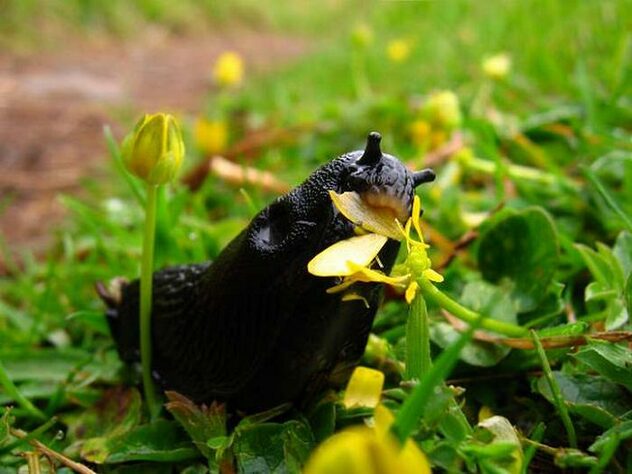
12. Kill slugs and snails
Of many uses of vinegar, this one is getting popular among gardeners. You can kill snails and slugs with the help of vinegar. Snails and slugs slither through your garden, chomping on succulent plants and leaving a slimy trail in their wake. Snails are gastropods, which means "stomach foot," and they are most active in the coolness of the night.
Killing snails is easier if you can get them to congregate in one spot rather than having to search them out one by one. Lay a board scrap or a flower pot on the ground and prop up one side, or turn orange, lemon, lime or grapefruit rinds upside down. Leave them overnight, and you'll find a snail convention underneath in the morning, as they will look for shelter from the sun and the daytime's heat.
You can use vinegar undiluted or mix it with an equal amount of water. Plain white vinegar works well, but you can also use apple cider vinegar if that's what you have on hand. Put the acidic mix in a spray bottle, spray the vinegar directly on the snails and wait. The vinegar will dissolve the snails, and you can wash the remains off your patio with a garden hose. Vinegar acts as an herbicide in some cases, though, so try to spray the snails after they've left the plants or you've picked them off. Generally, the vinegar will only affect snails when it is wet, but you can pour white vinegar onto dryer lint and place it around the garden to repel them.
Of many uses of vinegar, this one is getting popular among gardeners. You can kill snails and slugs with the help of vinegar. Snails and slugs slither through your garden, chomping on succulent plants and leaving a slimy trail in their wake. Snails are gastropods, which means "stomach foot," and they are most active in the coolness of the night.
Killing snails is easier if you can get them to congregate in one spot rather than having to search them out one by one. Lay a board scrap or a flower pot on the ground and prop up one side, or turn orange, lemon, lime or grapefruit rinds upside down. Leave them overnight, and you'll find a snail convention underneath in the morning, as they will look for shelter from the sun and the daytime's heat.
You can use vinegar undiluted or mix it with an equal amount of water. Plain white vinegar works well, but you can also use apple cider vinegar if that's what you have on hand. Put the acidic mix in a spray bottle, spray the vinegar directly on the snails and wait. The vinegar will dissolve the snails, and you can wash the remains off your patio with a garden hose. Vinegar acts as an herbicide in some cases, though, so try to spray the snails after they've left the plants or you've picked them off. Generally, the vinegar will only affect snails when it is wet, but you can pour white vinegar onto dryer lint and place it around the garden to repel them.
Courtesy of: https://balconygardenweb.com/
